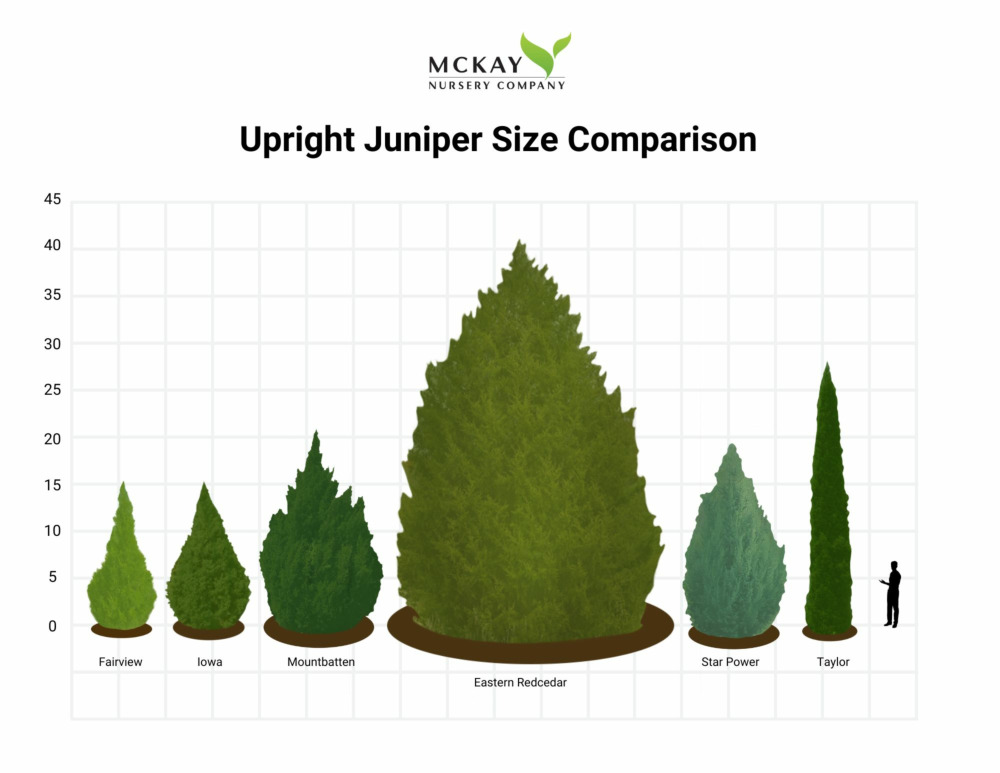Junipers
Junipers
Juniper shrubs and trees, scientifically named Juniperus, are hardy conifers and one of the most versatile and drought-tolerant evergreens. They start off with spiky foliage at first but then mature into flatter and softer evergreen foliage. Juniper foliage displays a vibrant range of colors—there’s dark- and light-green, silver-blue, and blue-green foliage. Some can even have a gold tone to them.
There are different forms of junipers, from low, medium-sized to large, to tall and narrow upright types. The low-type juniper varieties can be used as great groundcover in the landscape, and the large, upright, and more narrow juniper tree varieties work well for hedges, privacy, windbreaks, and screens.
Juniper trees and shrubs are great at preventing soil erosion, and because they’re drought-tolerant, they maintain their stunning foliage in rock gardens or even in just rocky soil.
Care and Maintenance
You can plant junipers during seasons with mild temperatures, like spring or fall. Juniper trees grow well in the full sun or light shade, and most thrive with very little pruning.
Junipers grow with limited water supply and tolerate many soil types but prefer well-drained soils and sunny spots in the landscape. Some varieties will produce small juniper berries that will attract birds in the winter months.
After planting them, they need regular watering to establish deep roots, but they are remarkably drought-tolerant once fully established. Annual pruning during the dormant season keeps them in shape and promotes healthier, bushier green foliage. A light application of balanced, slow-release fertilizer in early spring will help junipers thrive without the need for heavy feeding.
Pest and Disease Management
Managing pests and diseases effectively is crucial for maintaining the health of juniper plants. Regularly monitor for common pests such as spider mites, juniper scale, and juniper webworms. When these pests are detected, treating the plants with appropriate measures, like insecticidal soaps, can help control the problem. Make sure to read the product description and application instructions to ensure they won’t harm your juniper.
Diseases such as needle blight and cedar-apple rust also pose threats to junipers. Once you detect these diseases, remove the affected areas, avoid overhead watering, and apply fungicides as needed to prevent further spread.
Popular Juniper Varieties
There are quite a variety of juniper trees and juniper shrubs.
The Wisconsin Juniper is known for its resilience and dense foliage, making it an excellent choice for those looking for a hardy plant. The Grey Owl Juniper, with its silver-gray foliage, offers a beautiful contrast in the landscape.
Star Power Juniper trees are distinguished by their rapid growth and unique foliage pattern, ideal for adding a distinctive look to the garden. Mountbatten Juniper trees are valued for their height and robustness, perfect for creating privacy screens or hedges. The Eastern Redcedar Juniper trees are valuable for wildlife gardening—they offer dense foliage for bird shelter and produce berries as a food source in winter.
Browse Our Beautiful Selection of Junipers at McKay Nursery
At McKay Nursery, we pride ourselves on our extensive collection of juniper trees and shrubs, meticulously cared for and grown to meet all your landscaping and aesthetic desires. With a legacy spanning over a century in horticultural excellence, our team of dedicated horticulturists and specialists are experts in trees, shrubs, perennials, and more. We are committed to ensuring that every plant you receive from us is of the highest quality, backed by our deep knowledge and passion for horticulture.
Explore our shop today to find the perfect juniper tree for your garden, and start enjoying the enduring beauty and functional benefits these plants offer.

